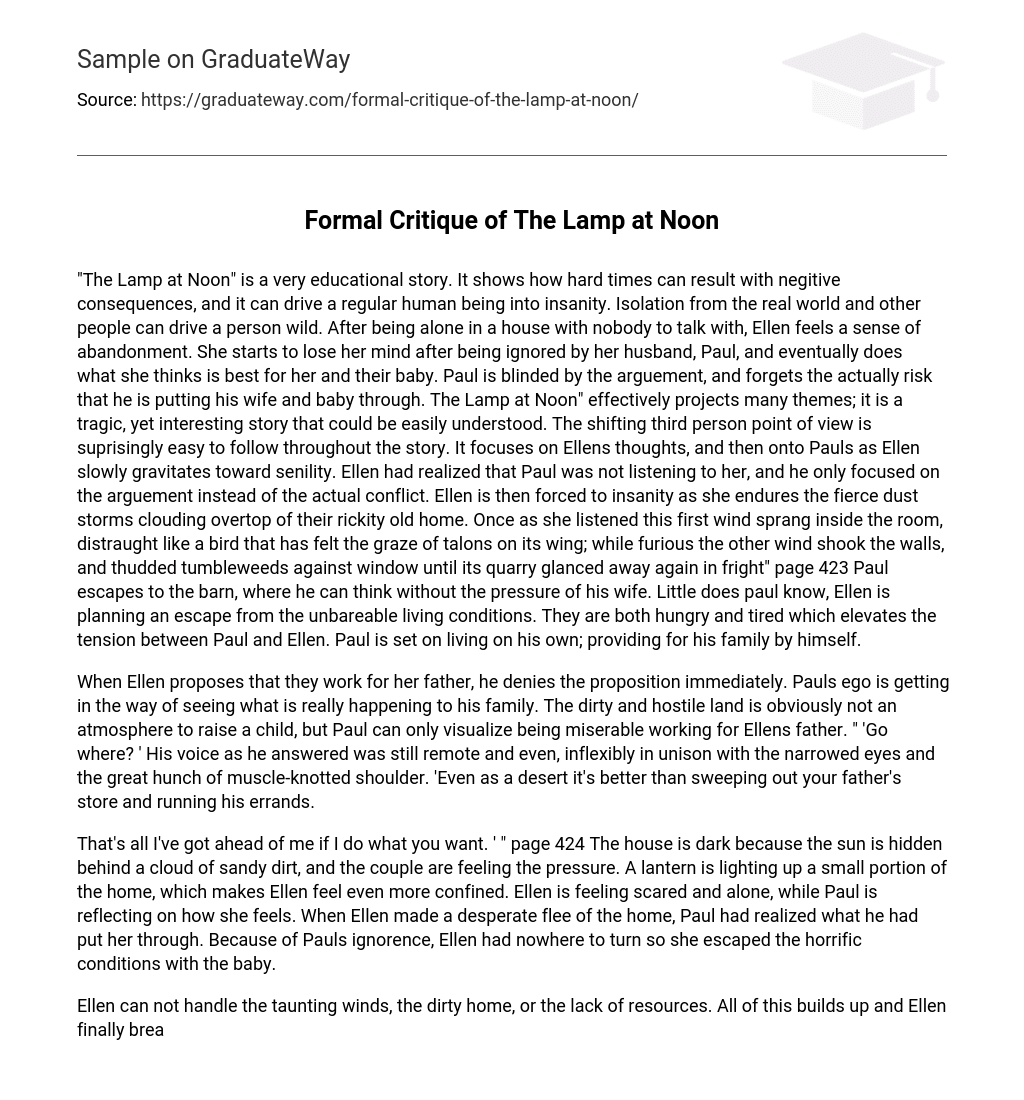“The Lamp at Noon” is a very educational story. It shows how hard times can result with negitive consequences, and it can drive a regular human being into insanity. Isolation from the real world and other people can drive a person wild. After being alone in a house with nobody to talk with, Ellen feels a sense of abandonment. She starts to lose her mind after being ignored by her husband, Paul, and eventually does what she thinks is best for her and their baby. Paul is blinded by the arguement, and forgets the actually risk that he is putting his wife and baby through. The Lamp at Noon” effectively projects many themes; it is a tragic, yet interesting story that could be easily understood. The shifting third person point of view is suprisingly easy to follow throughout the story. It focuses on Ellens thoughts, and then onto Pauls as Ellen slowly gravitates toward senility. Ellen had realized that Paul was not listening to her, and he only focused on the arguement instead of the actual conflict. Ellen is then forced to insanity as she endures the fierce dust storms clouding overtop of their rickity old home. Once as she listened this first wind sprang inside the room, distraught like a bird that has felt the graze of talons on its wing; while furious the other wind shook the walls, and thudded tumbleweeds against window until its quarry glanced away again in fright” page 423 Paul escapes to the barn, where he can think without the pressure of his wife. Little does paul know, Ellen is planning an escape from the unbareable living conditions. They are both hungry and tired which elevates the tension between Paul and Ellen. Paul is set on living on his own; providing for his family by himself.
When Ellen proposes that they work for her father, he denies the proposition immediately. Pauls ego is getting in the way of seeing what is really happening to his family. The dirty and hostile land is obviously not an atmosphere to raise a child, but Paul can only visualize being miserable working for Ellens father. ” ‘Go where? ‘ His voice as he answered was still remote and even, inflexibly in unison with the narrowed eyes and the great hunch of muscle-knotted shoulder. ‘Even as a desert it’s better than sweeping out your father’s store and running his errands.
That’s all I’ve got ahead of me if I do what you want. ‘ ” page 424 The house is dark because the sun is hidden behind a cloud of sandy dirt, and the couple are feeling the pressure. A lantern is lighting up a small portion of the home, which makes Ellen feel even more confined. Ellen is feeling scared and alone, while Paul is reflecting on how she feels. When Ellen made a desperate flee of the home, Paul had realized what he had put her through. Because of Pauls ignorence, Ellen had nowhere to turn so she escaped the horrific conditions with the baby.
Ellen can not handle the taunting winds, the dirty home, or the lack of resources. All of this builds up and Ellen finally breaks free. Paul does not feel Ellen’s pain throughout the story; he only see’s her being difficult and argumentitive. In reality, Ellen is losing her mind because of Paul’s absence during the hard times in the house. Paul is always coming and going from the house to the barn, but Ellen is always stationary. She has nothing to do and is getting annoyed with the baby crying. Ellen is having a nervous breakdown, but Paul is oblivious to the occurance.
Because Ellen is always in the house, she is severly bored and has a very high level of stress. Her accumilation of stress and anger explode, and she run’s away with the baby. When Paul finally realizes that Ellen is in desperate need of a companion, he is disturbed to see an empty crib, and no sign of Ellen. He realizes he has made a mistake by seeing the horses and cows becoming skin and bones from malnutrition. Paul eventually comes across Ellen holding a lifeless baby in her arms after searching the land. After having a sudden realization of his mistake, Paul tends to Ellen.
She is still in a state of shock because the baby is dead, but she is treating it like the opposite is true. “The child was quite cold. It had been her arms, perhaps, too frantic to protect him, or the smother of dust upon his throat and lungs. ” page 430 Paul knew he should have been more empathetic and comforting toward Ellen. She was very scared, and thought that there were no other way. If Paul had been with her in the house, she would not have felt so isolated, and would have been able to talk to Paul about her problems.
Sinclair Ross was able to show how some people can be caught up in an arguement and forget the important things. Paul was so involved with the disagreement that he forgot what it was about, which effected Ellen a great deal. If Paul was not set on being right, Ellen could have explained herself and convinced Paul to do the right thing. Ross also thoroughly explains that isolation and rough circumstances can be very stressful and could eventually lead to a drastic decision. Ellen had been held in a prison like environment, and did not respond well to the isolation and disparity.





